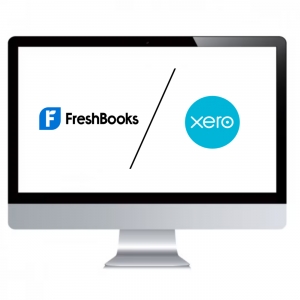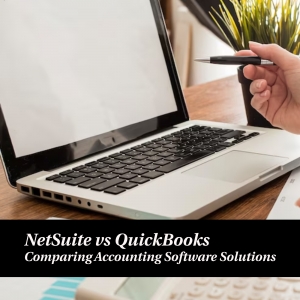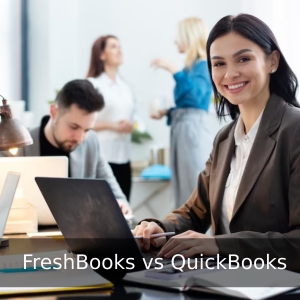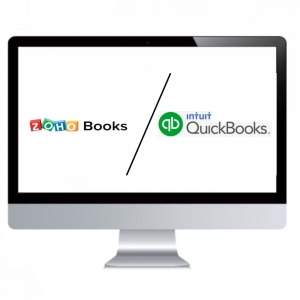Introduction
As a small business owner, managing finances and staying on top of invoicing can be overwhelming. That's where accounting software comes in handy. FreshBooks and Xero are two popular options for those looking to streamline their financial management processes. But which one is the best fit for your business? In this article, we'll compare the key features of FreshBooks vs Xero to help you make an informed decision and choose the one that suits your needs best. So sit back, relax, and let's dive into the world of accounting software!
FreshBooks vs Xero Features Comparison
When it comes to choosing a cloud-based accounting software, two of the most popular options are FreshBooks and Xero. FreshBooks vs Xero both offer similar features but with some key differences that can make one more suitable for your business than the other.
FreshBooks is known for its user-friendly interface and simple design, making it an excellent choice for small businesses or freelancers who want to keep their accounting tasks straightforward. It offers time tracking, project management tools, invoicing capabilities, and expense tracking.
On the other hand, Xero provides a more comprehensive set of features that cater to medium-sized or larger companies. It has advanced inventory management tools, purchase order creation capabilities, payroll processing functionalities and over 800 integrations with third-party applications.
While both FreshBooks and Xero have mobile apps available on iOS and Android devices which allow you to access your data anytime anywhere on-the-go via smartphones or tablets; they differ in terms of their pricing plans. FreshBooks offers three different pricing tiers while Xero offers five different plan options depending upon your requirements.
Ultimately the choice between FreshBooks vs Xero depends on what works best for your business size needs as well as budget constraints.
The key features of FreshBooks
FreshBooks is a cloud-based accounting software that has been designed to cater to the needs of small businesses. Here are some key features of FreshBooks that make it stand out in the market.
The first feature is its user-friendly interface, which makes navigation and use very easy for beginners. The dashboard provides an overview of invoices, expenses, and other financial data at a glance. This helps users stay organized and on top of their finances.
Another significant aspect of FreshBooks is its invoicing capabilities. Users can create professional-looking invoices quickly with customizable templates or send automatic recurring invoices to clients with subscriptions. Additionally, FreshBooks allows you to set up late payment reminders with automated notifications – ensuring timely payments from your clients.
One more important feature is expense tracking: With FreshBooks' expense tracking capability, users can keep track of all expenses incurred in running their business. Whether it's travel expenses or office supplies purchases – everything can be easily recorded within the software.
Time-tracking: Time Tracking in FreshBooks enables you to manage projects by allowing you to track billable hours spent on each project separately – making it perfect for freelancers or contractors who invoice based on hourly work done.
In summary, these key features are just some examples as they provide many others too!
The key features of Xero
Xero is an accounting software designed for small businesses. It offers a wide range of features that make it easy to manage finances, invoicing, and payroll. One of the key features of Xero is its ability to integrate with other business apps such as Stripe and PayPal.
Another great feature of Xero is its customizable dashboard where users can easily view their cash flow, income and expenses in real-time. The software also has built-in tools for tracking inventory and managing purchase orders which are essential for businesses dealing with e-commerce.
With Xero's invoicing feature, users can quickly create professional-looking invoices using custom templates or from scratch. Users can also set up invoice reminders so they never forget to follow-up on payments. In addition, customers have the option to pay directly through the invoice using various payment methods like credit cards or bank transfers.
Xero also supports multi-currency transactions making it perfect for businesses operating globally. Additionally, users can easily reconcile their bank accounts automatically using Xero's bank feeds feature saving time spent on manual data entry.
Xero's extensive list of features makes it one of the top accounting software options available today catering primarily towards small businesses looking for an all-in-one solution.
The pricing of FreshBooks vs Xero
When it comes to choosing an accounting software, pricing is always a significant factor to consider. Both FreshBooks and Xero offer different plans with various features at different price points.
FreshBooks offers four pricing plans: Lite, Plus, Premium, and Select. The Lite plan starts at $15 per month for up to five clients, while the most expensive plan - Select - costs $50 per month for up to 500+ clients.
On the other hand, Xero offers three pricing plans: Early ($11/month), Growing ($32/month), and Established ($62/month). The Early plan allows you to send invoices and quotes only to five customers while Growing includes unlimited invoicing and bills. If you need multiple currencies or advanced inventory management options then the Established Plan might be your best choice.
While FreshBooks' pricing may seem steep compared with some of its alternatives on the market today such as Wave Accounting or Zoho Books which have free versions available; it's important to note that FreshBooks has more robust time tracking features than these programs do.
Both FreshBooks vs Xero have their respective strengths in terms of features offered versus price paid. In making a decision between them or any other accounting software though we recommend taking into account all factors including ease-of-use support availability customer service reputation etc before making a final call!
The verdict
After comparing the features and pricing of FreshBooks vs Xero, it's clear that both accounting software options have their strengths and weaknesses.
FreshBooks is a great option for small business owners who prioritize user-friendly design, time tracking, and invoicing capabilities. It's perfect for those who don't require complex inventory management or payroll processing.
On the other hand, Xero offers more advanced features such as project management tools, expense claims, purchase orders, and multi-currency support. It's an excellent choice for mid-sized businesses that need a more comprehensive accounting package.
When it comes to pricing, FreshBooks' plans are cheaper than Xero's across all tiers but don't offer as many features compared to its higher-priced competitors. Meanwhile, Xero has four different pricing tiers with varying levels of functionality depending on your needs.
Ultimately the decision between FreshBooks vs Xero will depend on what you're looking for in an accounting software solution. Be sure to weigh up each platform’s pros and cons before making a final decision.





